I WOULD have produced my usual scribble, but the death of Nelson Mandela compels me, perhaps for a final time, to tell some last few stories about my limited dealings with this great and enigmatic man — a man who always spoke his mind.
It’s 1994, and Mandela is visiting the US, where he’s enduring a press conference with Bill Clinton on the South Lawn of the White House, in front of us hacks.
"It makes no difference to us in South Africa who is staying in this house," says Mandela, indicating behind himself with a thumb at the "house" in question. It seems an astonishing thing to say, standing alongside its number one resident. Well, at least number two, then.
He relates that the first world leader to call him on his release had been George H Bush, whose son, George W, Mandela would say years later, was "not able to think".
Mandela’s point, which he makes at some length in the presence of Clinton and the Washington press mob, is that any US president, Republican or Democrat, would be a friend of South Africa, and that he perhaps expects a special effort from Clinton, a Democrat.
Later, Mandela professed himself disappointed at the US’s lack of generosity towards the new, democratic South Africa, saying on his return that the Americans had offered "peanuts". And he said things about Cuba and Libya certain to further gall the US.
The interlude at the White House was captured in a photograph I now have on my wall, taken by the late Alf Kumalo, and it shows Mandela, one hand on the lectern, and the other huffily on his hip, as Clinton spins his yarns, as only Clinton could. Mandela looks peeved all right, in a moment typical of his refusal to remain silent when he felt something needed to be said.
Clinton, though, was a tough campaigner, not about to let minor disagreements interfere with his relationship with Mandela. Years later, when he was entangled in his infamous intern scandals, Mandela supported the underdog president of the US, which helped save his bacon.
Before Washington, we had been in New York, where Mandela addressed the United Nations, was hosted by the Rockefellers at the Waldorf Astoria, and visited Rudi Giuliani, the mayor of New York, at his residence, Gracie Mansion, which led to an amusing incident involving Alfred Nzo, who was foreign minister, and Mandela.
Nzo was shuffling around the stately old house, going from one side of the historic reception hall to the other on his tasks. Except that Mandela was standing in the middle of the room, meeting people queuing to shake his hand. The only way Nzo figured he could get from one side of the room to the other was by repeatedly joining the queue of people meeting Mandela, which he did, about four times. And each time Mandela would greet him with exaggerated ceremony, "Ah Mr Nzo, how nice to meet you again!" and the bashful Nzo would shake his hand and then proceed on his confused diplomatic mission.
The next year, Mandela went to Japan and South Korea, so I was sent there as well, and the dollar was worth about 80 yen. The only thing a skint hack could afford to eat — outside of the official banquets and cocktails — was the cheapest offering from McDonald’s, for five days!
Thankfully, Trevor Manuel was opening a sushi bar in Tokyo, offering South African fish, so we went along there to eat raw fish and feign interest in trade relations.
At the end of this feast-and-famine Japanese chapter, I was one of two journalists to fly with Mandela in his official jet, from Tokyo to Seoul, South Korea. When we got on the aircraft, Mandela was already seated, eating a stick of droëwors, a rough blanket covering his knees.
He opened with a long story about how a Japanese royal had gone out of her way to meet him, how astounded he was that a royal would lower herself to want to acquaint herself with him, forsaking all royal protocol to do so!
We took off, and I had all my little Japanese investment questions for him, but needn’t have bothered because he clearly had other things on his mind. Like the Third Force, for one. Did we know who the Third Force was, the shadowy police/security force/right-wing group said to have fomented violence in the transition years from 1990?
Never mind, he was going to tell us, anyway, and he proceeded to name his police chief as the Third Force.
We land in Seoul. Yes, it’s okay to use all of what I said, says Mandela, but his office in Pretoria had already got wind of it, and was horrified at his indiscretions. Of course, they pleaded with the publications concerned not to run the story, but it was obvious that one could hardly ignore the statements of a president at the request of his office.
So the story ran, and caused a lot of trouble, if nothing else, demonstrating only how hard-headed Mandela could be when something annoyed him. He just couldn’t hold back.
Often he would remove his glasses as a prelude to saying something newsworthy — like at a farmers’ congress, where the chief farmer implied that Mandela agreed there should not be a truth commission.
"Over my dead body," said Mandela departing from his prepared agricultural niceties, glasses in hand.
That was Mandela — always speaking his mind, and quite often his heart, too!


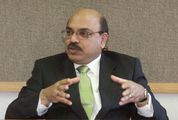
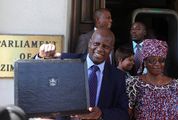
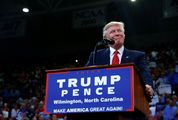
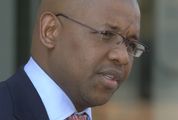




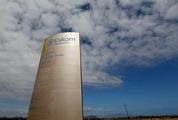
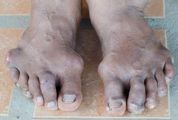
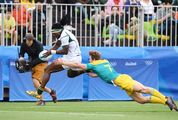
 News and views on the death, and life, of former president Nelson Mandela, with tributes and photographs
News and views on the death, and life, of former president Nelson Mandela, with tributes and photographs




